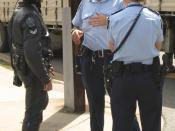Police gratuities - the long-time and controversial practice of providing unsolicited largess to sworn law enforcement officers - is a situation that was debated on legal and moral grounds. The acceptance of gratuities has been scrutinized since the beginning of policing. The gratuity provenance stems from the early days of policing when service was provided by a fee-for-service system. When a citizen's property was stolen, one would pay a certain fee to have the police recover the goods and arrest the perpetrator.1 This fee-for-service system was not continued because police service was seen as a public entitlement. Restricting police service to only those who could afford to pay would create a social injustice. The thought in a democracy is that public services should be equally available to all. (www.clearwaterpolice.org/articles/andrews.as)
Are police officers unethical to accept gifts like free coffee and dinners? What I saw as a wrong act was taken by others, as a right.
Gratuity is something given willingly or beyond compulsion generally for some service. The concern becomes cloudy as to whether the receiving of free coffee and free or cut-rate meals is in fact, by definition, a gratuity. Even if the receiving of free or cut-rate items is not taken formally as a gratuity, does this mean that its acceptance is justly sound?
Some police officers have departmental policies that affirm that officers can accept gratuities as long as they do not ask for them. Other officers describe difference between what is an permitted gratuity. Could ethical opinion of receiving gratuities be a matter of belief, or are the taking of gratuities a community social act that should persist as an association between the community and the police? Different opinions are present among officers, as well as in different books and studies.
Distinction between gratuities and corruption...


